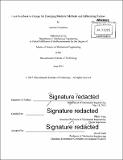User feedback in design for emerging markets : methods and influencing factors
Author(s)
Florentine, Jasmine
DownloadFull printable version (10.25Mb)
Other Contributors
Massachusetts Institute of Technology. Department of Mechanical Engineering.
Advisor
Maria Yang.
Terms of use
Metadata
Show full item recordAbstract
Designing products for emerging markets in the developing world can be difficult. Design theory holds that understanding the user better can improve the success of the product, however, formal user research approaches designed for conventional markets may not be effective in emerging market scenarios. This thesis explores three factors that can affect the quality of user feedback: the method used, the demographic of the user, and the type of prototype presented to the user for feedback. Data is collected from two different case studies conducted via field studies in India. The first case study investigates a novel solar technology, and the second centers around a technology to improve rural agriculture. In these case studies, results show that the user research method used yielded the type of feedback expected in conventional settings, although users had difficulty with more abstract concepts. Demographics played an important role in that younger and/or more educated users were more open to giving criticism and asking questions. Users were generally able to understand that prototypes were only a representation. 3-D prototypes sometimes caused users to fixate on certain form factors, whereas 2-D prototypes allowed them to interpret concepts more ambiguously..
Description
Thesis: S.M., Massachusetts Institute of Technology, Department of Mechanical Engineering, 2015. Cataloged from PDF version of thesis. Includes bibliographical references (pages 76-78).
Date issued
2015Department
Massachusetts Institute of Technology. Department of Mechanical EngineeringPublisher
Massachusetts Institute of Technology
Keywords
Mechanical Engineering.